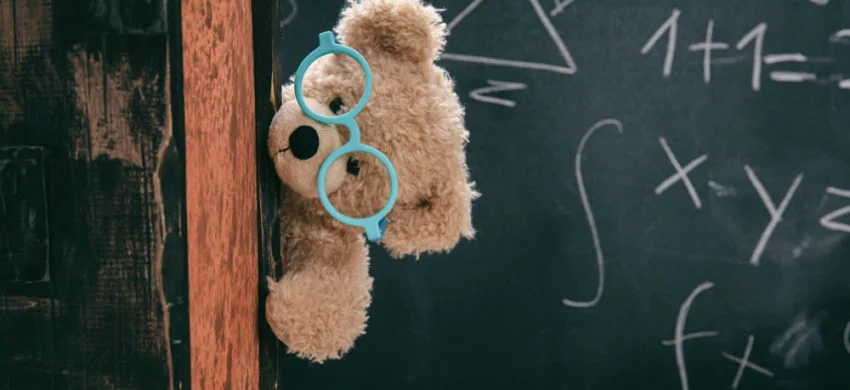
Vielen ist es nicht bewusst, aber wir alle verwenden Mathematik in unseren alltäglichen Routinen Aktivitäten, sogar die kleinen Kinder in den jüngsten Jahren. Die meisten Kinder wissen nicht nur, wie man zählt, sondern können auch einfache Additions- und Subtraktionskonzepte verstehen und anwenden.
Zum Beispiel wissen Kinder schon in sehr jungen Jahren, dass sie, wenn sie zwei Kekse haben und diese mit einem Freund teilen, dass Ihnen nur noch eins zum Knabbern übrig bleibt.
Wie kann man mit der Mathematik zu Hause beginnen?
Wenn Kinder in die Schule kommen und ihre Bildungsreise beginnen, lernen sie fortgeschrittenere mathematische Konzepte. Sie können Ihrem Kind jedoch zu Hause einen kleinen Vorsprung verschaffen, indem Sie alltägliche Aktivitäten mit der Mathematischen Logik verbinden.
- Backen kann lehrreich für Ihre Kinder sein
Mathematik wird immer zum Backen verwendet – da beispielsweise Pfannkuchen und Pudding Zutaten in unterschiedlichen Mengen beinhalten. Zum Beispiel bedeutet das Verdoppeln von Rezepten, die Masse der Zutaten mit zwei zu multiplizieren. Die Halbierung von Rezepten erfordert andererseits die Aufteilung der Masse. Sie können auch Kleinkindern beim Backen einfache Aufgaben zuführen.
- Verwenden Sie Konstruktionsspielzeug
Legos, Holzklötze und anderes Spielzeug sind ideal, um Kindern eine Vielzahl von mathematischen Fähigkeiten und Konzepten beizubringen. Dazu gehören Zählen, Addieren, Multiplizieren und Messen.
Wenn Ihre Kleinen etwas aus leeren Müslischachteln und Milchflaschen bauen, lernen sie auch mehr über Formen und Manipulationen. Nistkästen und Tassen ermöglichen es jüngeren Kindern ausserdem, die Beziehung zwischen Objekten unterschiedlicher Grösse zu verstehen.
Egal, welches Spielzeug oder welche Gegenstände Sie zu Hause haben, verbringen Sie einige Minuten am Tag mit Ihren Kindern, um etwas zu bauen. Auf diese Weise können Sie ihnen auch helfen, verschiedene mathematische Fähigkeiten durch eine einfache, unterhaltsame Aktivität zu erlernen.
- Mit Formen spielen
Wenn Sie zu Hause Spielzeug zum Sortieren von Formen haben, machen Sie es sich zur Gewohnheit, mit Ihren Kindern zu spielen, insbesondere mit den jüngeren. Zählen Sie beim Spielen die Seiten jeder Form. Ermutigen Sie sie, sich auch die Namen der einzelnen Formen zu merken. Dies ist eine grossartige Möglichkeit, grundlegende Geometrie in sie einzuführen.
- Verwendung von Stoppuhren beim Spielen oder anderen Aktivitäten
Die meisten Kinder im jungen Alter haben grosses Interesse an Stoppuhren, Timer oder Sanduhren. Wenn Ihre Kinder von diesen Gegenständen fasziniert sind, nutzen Sie diese Gelegenheit, um ihre Zählfähigkeiten zu verbessern.
Zum Beispiel können Sie Stoppuhren verwenden, um Ihren Kindern die Zahlen beizubringen oder die Zahlen auf der Uhr nachzuschreiben. Dies wird Kindern auch gleichzeitig helfen, ein Zeitgefühl zu entwickeln. Darüber hinaus werden sie auch verstehen, dass einige Dinge länger dauern als andere.
- Schaffen Sie Ihren Kindern ein Sparschwein an
Ein Sparschwein kann eine weitere grossartige Möglichkeit sein, das Zählen, Addieren und Subtrahieren zu lehren. Dies kann mit dem Kleingeld so einfach sein. Zählen Sie gemeinsam mit wie viele Münzen im Sparschwein enthalten sind und erklären Sie Ihrem Kind wie viel es ggf. noch brauch um sich etwas kaufen zu können oder was in dem Wert des angesparten gekauft werden kann.
Wenn Sie der Meinung sind, dass Ihr Kind zusätzliche Mathematik Nachhilfe oder Primärschule Nachhilfe benötigt, helfen wir Ihnen gerne mit unserer Mathematik Nachhilfe in Aarau, Mathematik Nachhilfe in Basel, Mathematik Nachhilfe in Bern und Mathematik Nachhilfe in Solothurn weiter. Ein Tutor kann eine fantastische Option sein, um Ihren Kind die zusätzliche Unterstützung, Sicherheit, Motivation und Lerntechniken zu geben.

